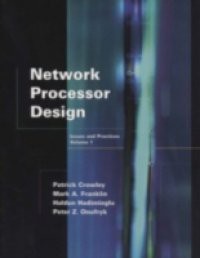As the demand for digital communication networks has increased, so have the challenges in network component design. To meet ever-escalating performance, flexibility, and economy requirements, the networking industry has opted to build products around network processors. These new chips range from task-specific processors, such as classification and encryption engines, to more general-purpose packet or communications processors. Programmable yet application-specific, their designs are tailored to efficiently implement communications applications such as routing, protocol analysis, voice and data convergence, firewalls, VPNs, and QoS.Network processor design is an emerging field with issues and opportunities both numerous and formidable. To help meet this challenge, the editors of this volume created the first Workshop on Network Processors, a forum for scientists and engineers from academia and industry to discuss their latest research in the architecture, design, programming, and use of these devices. In addition to including the results of the Workshop in this volume, the editors also present specially commissioned material from practicing designers, who discuss their companies' latest network processors. Network Processor Design: Issues and Practices is an essential reference on network processors for graduate students, researchers, and practicing designers.* Includes contributions from major academic and industrial research labs including Aachen University of Technology; Cisco Systems; Infineon Technologies; Intel Corp.; North Carolina State University; Swiss Federal Institute of Technology; University of California, Berkeley; University of Dortmund; University of Washington; and Washington University. * Examines the latest network processors from Agere Systems, Cisco, IBM, Intel, Motorola, Sierra Inc., and TranSwitch.

